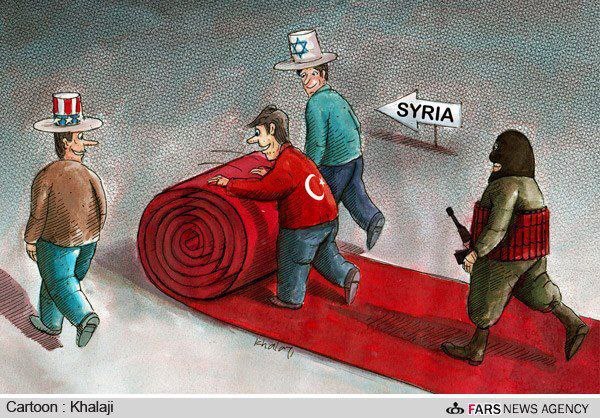Published Tuesday, November 12, 2013
 Istanbul – The ambitions of Turkish Prime Minister Recep Tayyip Erdogan did not arrive at their desired ends. Turkey has not made a good return on its investments in Egypt, Syria, and Tunisia.
Istanbul – The ambitions of Turkish Prime Minister Recep Tayyip Erdogan did not arrive at their desired ends. Turkey has not made a good return on its investments in Egypt, Syria, and Tunisia. The blows Turkey’s allies received in the countries of the “Arab Spring” in the span of less than three months – the ouster of Egyptian President Mohamed Mursi; the political crisis afflicting Tunisia’s Islamist-led administration; and the Russian-American agreement over a political settlement in Syria – have pushed Erdogan’s government to reformulate its foreign policy, seeking to limit the damages incurred.
The blows Turkey’s allies received in the countries of the “Arab Spring” in the span of less than three months – the ouster of Egyptian President Mohamed Mursi; the political crisis afflicting Tunisia’s Islamist-led administration; and the Russian-American agreement over a political settlement in Syria – have pushed Erdogan’s government to reformulate its foreign policy, seeking to limit the damages incurred.For the Turkish government, the priority now is to restore relations with Turkey’s neighbors to their state preceding the Syrian crisis, which has pitted Ankara against Baghdad and Tehran. Quickly, the Turkish government took concrete steps in this direction by undertaking mutual visits and extending invitations to Iraqi officials to visit Ankara.
More importantly, the Turkish government wants to restore economic ties with Iraq, one of its most important trade partners. Turkey was the first country to sign an agreement for strategic cooperation with Iraq back in 2009. After the US invasion of Iraq, Turkey went on to benefit the most economically from its southeastern neighbor, with contracts worth anywhere from $30 to 40 billion.
It is in this context that Turkish Foreign Minister Ahmet Davutoglu has visited Baghdad, especially after Iraqi Prime Minister Nouri al-Maliki declined his Turkish counterpart’s invitation to visit Turkey last month, requiring first an apology for Ankara’s policies against him and against Iraq. Baghdad also demanded that Ankara expel Iraqi Vice President Tareq al-Hashemi, who is sentenced to death in Iraq, from Turkish territory. The apology that Davutoglu seems to have traveled to Baghdad to deliver, will be the first of many messages that Erdogan is expected to send, including to Syria through Maliki, with an offer to close borders with Syria and prevent foreign terrorists from crossing over and then infiltrating Iraq.
The impression is that Maliki will not stop at these demands. The Turkish ploy to convince the Iraqi prime minister to visit Ankara, through which Erdogan wants to make his return to the region, will not fool Maliki and his allies in Damascus, Tehran, Beirut, and even Moscow – especially in light of current circumstances where Syrian President Bashar al-Assad is in a stronger position internally, and where Iran is on its way to conclude new strategic understandings with Washington and the West.
For Western capitals, things in Syria have become crystal clear, despite all attempts by Saudi, Turkey, and Qatar to obscure the facts. Al-Qaeda, al-Nusra Front and similar terrorist groups now pose a serious threat to all Western regional calculations, even if the latter were indeed seeking to redraft the Sykes-Picot map of the Middle East. It is clear that the descendants of Sykes and Picot will not tolerate an extremist Islamic state on the border with Iraq, Syria, and Turkey.
All this has prompted Erdogan to make his urgent move toward Baghdad. Erdogan believes that a successful visit by Maliki to Turkey would pave the way for another détente with a visit by Iranian President Hassan Rouhani to Ankara.
 It remains for Ankara to prove to Maliki first that it is not seeking to undermine Iraq’s national and strategic security, including through both overt and covert alliances with Iraqi Kurdistan Region President Massoud Barzani – who did not hesitate to besiege the Kurdish Democratic Union Party in Syria at the request of Erdogan, after the latter failed to convince the Kurdish party of rebelling against Assad.
It remains for Ankara to prove to Maliki first that it is not seeking to undermine Iraq’s national and strategic security, including through both overt and covert alliances with Iraqi Kurdistan Region President Massoud Barzani – who did not hesitate to besiege the Kurdish Democratic Union Party in Syria at the request of Erdogan, after the latter failed to convince the Kurdish party of rebelling against Assad.Meanwhile, Assad may be preparing to declare his most significant victory yet, when he would find Davutoglu standing at the gates of his palace in Qassioun, to tell him what he wants to hear from him, Erdogan, and Turkish President Abdullah Gul. It is very likely that Gul might return as prime minister, after Erdogan is elected president next summer.
This article is an edited translation from the Arabic Edition.
